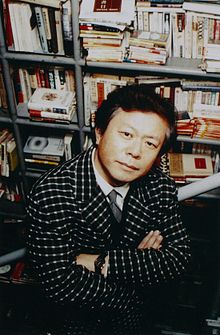- Naoki Inose
-
Naoki Inose (猪瀬 直樹 Inose Naoki, born on 20 November 1946 in Nagano Prefecture) is a Japanese journalist, historian, and social critic, and a biographer of literary figures such as Yukio Mishima and Osamu Dazai. Since 2000 he has devoted himself to current affairs, and in June 2007 he was appointed vice governor of Tokyo.[1]
Contents
Historical works
Inose's book Showa 16-nen Natsu no Haisen (1983), which may be translated "Defeated in War in the Summer of 1941," describes the Soryokusen Kenkyujo, or the Total War Research Institute. During the International Military Tribunal for the Far East it would be accused of being part of Japan's militaristic machine, but in reality it was a think tank, of which the purpose was to examine dispassionately the consequences of a total war. Its conclusion was that "there will be no way for Japan to win the war because of its clear material inferiority. The war will be drawn out. The Soviet Union will butt in, and Japan will be defeated. Therefore, going to war with the United States must absolutely be avoided."[2]
This book was followed by The Mikado's Portrait (Mikado no shozo, 1987), concerning the development of the image of the Emperor, and the biographies of Mishima, Dazai and Kikuchi Kan: Persona (Perusona, 1995), Picaresque (Pikaresuku, 2000), and The Realm of Heart (Kokoro no okoku, 2004). In 2009, his book "The Century of Black Ships" (Kurofune no seiki, 1993) was published in English.
Recent arguments
Inose's examination of public affairs has led him to bitter criticisms of Japan's ruling classes and their reluctance to enact reform. His longstanding proposal was for the privatisation of the four public highway corporations, and reform of the postal savings system that finances them.[3] As a result, he joined Prime Minister Junichiro Koizumi's taskforce and served on the commission to examine the Japan Highway Public Corporation (Nihon Doro Kodan).[4] His insistence that cuts be made was so uncompromising that some other appointees declined positions on the board.[2]
Inose has said that Japan lost World War II because the government at the time ignored data suggesting Japan would be unable to defeat the Allies and forbade access to the information before Tokyo declared war in 1941. He has further argued that this action is being repeated today by bureaucrats with respect to the economy.[5]
He advocates that people share accurate information with respect to Japan's economic situation, that is not necessarily issued by bureaucrats, in efforts to help a debt-ridden Japan. He claims that "any reform can be implemented if people share more accurate and objective data than that (initially) released by authorities."[5]
Tokyo Metropolitan Government
On 15 June 2007, Governor of Tokyo Metropolitan Government Shintaro Ishihara announced that Inose had agreed to serve as a vice governor for the capital stating that "our opinions might differ but I believe it is healthy for us to debate and discuss many of our differences."[6]
The governor is hoping to use Naoki's expertise on public administration to counterbalance national executive power: "Inose can speak up to the central government."
References
- ^ Jun Hongo. "Ishihara's new right-hand man settles in." Japan Times, 20 Sep 2007.
- ^ a b Hiroaki Sato. "Foreseeing the future -- and ignoring it." Japan Times. 26 Jan 2004.
- ^ Jeremy Warner. "Outlook: Japan's challenge; change in a country that's immune to it." The Independent. 31 Dec 2003.
- ^ "New politics, old politicians." The Economist. 6 Oct 2005.
- ^ a b "Follow the truth and not bureaucrats: Inose." Japan Times. 20 July 2002.
External links
- Official profile in English
- Photograph of Naoki's appointment as Vice Governor
Categories:- 1946 births
- Living people
- Biographers
- Japanese critics
- Japanese historians
- Japanese journalists
- Japanese writers
- People from Nagano Prefecture
- Shintarō Ishihara
- Yukio Mishima
Wikimedia Foundation. 2010.

